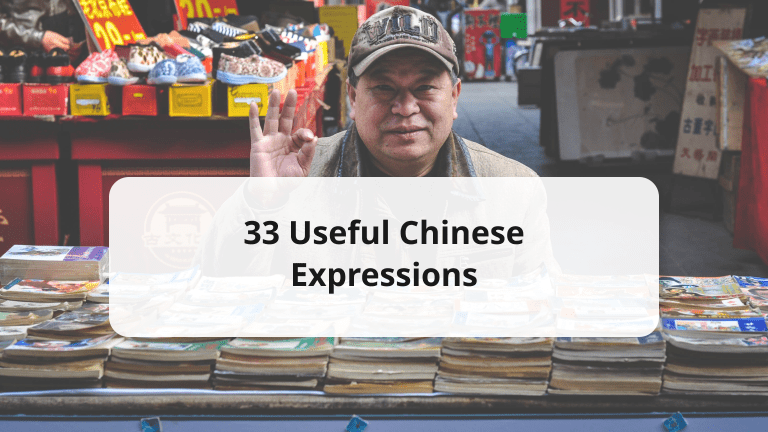Chinese expressions are the best place to start your learning journey since these expressions and phrases will allow you to have a basic conversation whether you are traveling, trying to communicate with a local community, or simply learning Chinese for personal improvement.
That being said, there are mainly 3 reasons why Chinese is considered hard to learn;
First, is the four-tone pronunciation. Same romanization of a Chinese character with a different tone will have different meanings and misusing them might lead to misunderstandings. In our article traditional Chinese characters, we have explained this in detail.
Second, there are two main systems of Chinese characters. Simplified Chinese; used in Mainland China and some of the Southeast Asian countries, is used by most Chinese speakers nowadays. Traditional Chinese is used in Taiwan and Hong Kong. Every character has its own meaning and pronunciation. Also, there is a writing system called “pinyin”, which is simply a romanization of the pronunciation of characters with tones.
Finally, since Chinese has been widely spread in East and Southeast Asia, and has many different dialects
Table of Contents
Common Greetings in Mandarin
These are the greetings and Chinese phrases to know that are used in everyday life, but to have a deeper understanding of them be sure to check out our article on hello in Chinese. If you are also interested in learning about farewells, we covered that in our article goodbye in Chinese.
1. Hello: 你好 – Nǐ Hǎo (Nee How)
‘Nǐ Hǎo‘ is a polite way to greet people, probably one of the most common Chinese phrases, usually used when first knowing a person or to people you are not familiar with. If you are meeting your friends, just simply say ‘Hi’!
2. Good morning: 早安/早上好 – Zǎo Ān (Zow An)/Zǎo Shàng Hǎo (Zow Shuan How)
3. Good afternoon: 午安/中午好 – Wǔ Ān (Oo An)/Zhōng Wǔ Hǎo (Jong Oo How)
‘Zǎo Ān’ and ‘Wǔ Ān’ are often used in Taiwan, and in Mainland China, people use ‘Zǎo Shàng Hǎo’ and ‘Zhōng Wǔ Hǎo’ instead. Don’t worry if you use the wrong one, people can understand you either way. That is the beauty of basic Chinese phrases.
4. Good evening: 晚上好 – Wǎn Shàng Hǎo (Wu-an Shuan Hao)
Good evening is not often used in Taiwanese culture. In Taiwan, when you meet a person in the evening, it is fine to just say ‘Nǐ Hǎo’ or ‘Hi’! Which is one of the simple Mandarin phrases.
5. Good night: 晚安 – Wǎn Ān (Wuan An)
6. Nice to meet you: 很高兴认识你 – Hěn Gāo Xìng Rèn Shì Nǐ (Hen Gow Sing Ren She Nee)
7. How are you doing: 最近過得如何 Zùi Jìn Gùo De Rú Hé? (Jui Gin Guo Deh Roo Her)
8. What are you up to: 最近再做什麼? – Zùi Jìn Zài Zùo Shé Me? (Jui GIn Zai Zoo Sheg Meh)
9. Have you eaten: 吃過了嗎 – Chī Gùo Le Mā? (Chee Goo-oh Leh Ma)
In Chinese culture, it is common to ask people if they have eaten or not to show their care towards that person.
10. How’s your day: 今天過得好嗎 – Jīng Tīan Gùo De Hǎo Mā? (Jin Tien Goo Deh How ma)
Basic Chinese Expressions
These basic expressions are commonly used in everyday conversations.
1. Thank you: 謝謝 – Xiè Xiè (Shieh Shieh)
Thank you in Mandarin is definitely a must to learn. You will be using this, a lot!
2. Excuse me: 不好意思 – Bù Hǎo Yì Sī (Boo How Yee Su)
This phrase is useful either to ask people to make way for you to pass or simply to ask for help from others. You can also use it when trying to get attention from waiters or clerks in stores. Learning how to say excuse me Chinese will surely come in handy.
3. I am sorry: 對不起 – Dùi Bù Qǐ (Doo-eh Boo Chi)
4. It’s fine: 沒關係 – Méi Gūan Xī (May Guan Shi)
5. Please…: 請 – Qǐng (Ching)
In English, ‘please’ can be used at the start or at the bottom of the sentence. In Chinese, Qǐng always comes in first.
6. No problem: 沒問題 – Méi Wèn Tí (May Wen Tee)
This phrase can be used when you try to give a positive response to requests from others. If you want to respond to a ‘Thank you, the next expression might be a better choice.
7. You are welcome: 不客氣 – Bú Kè Qì (Boo Ker Chi)
After “thank you”, you are welcome in Chinese is another phrase that you will use every day!
8. Of course: 當然 – Dāng Rán (Dang Ran)
Another useful expression as a substitute for ‘Méi Wèn Tí ‘(No problem)
9. Yes: 是 – Shì (Shee)
Although it may be easy to say “yes” with one character, in our article yes in Chinese we have shared details about how to use confirmations.
10. No: 不 – Bù (Boo)
Useful questions
In the following section, you can learn some useful sentences when traveling, which will make your trip so much easier, after you learn how to say hello in Chinese ofcourse!

1. Do you speak English: 你會說英語嗎 – Nǐ Hùi Shūo Yīng Yǔ Mā? (Nee Hoo-eh Shu-oh Yin Yu Mah)
2. How much does it cost: 這個多少錢 – Zhè Ge Dūo Shǎo Qían? (Zheh Go Doo Shau Che-an)
3. Where is the restroom: 洗手間在哪裡 – Xǐ Shǒu Jīan Zài Nǎ Lǐ? (See Shau Ji-an Zai Na Lee)
4. Do you have coffee: 你有咖啡嗎 – Nǐ Yǔo Mài Kā Fēi Mā? (Nee Yee-oh Mai Ka Fay Ma?)
Also, if you would like to put a number for that coffee order, be sure to check out our article on Chinese numbers.
5. What’s your name: 你叫什麼名字 – Nǐ Jìao Shé Me Míng Zì? (Nee Je-ow Sheh Meh Min Gee)
6. What do you do: 你做什麼工作 – Nǐ Zùo Shé Me Gōng Zùo? (Nee Zoo-oh Sheh Meh Gong Zoo-oh)
Other useful phrases
1. My name is…: 我叫做 – Wǒ Jìao Zùo... (Wuh Jeow Zoo-oh…)
2. I am from America: 我來自美國 – Wǒ Lái Zì Měi Gúo (Wuh Lie Zee Meh Goo-oh)
3. I speak a little Chinese: 我會說一點中文 – Wǒ Shùo Yì Dǐan Zhōng Wén (Wuh Shoo-eh Yee Deean Jong Wen)
4. I don’t know: 我不知道 – Wǒ Bù Zhī Dào (Wuh Boo Gee Dow)
5. Can you say it again?: 可以再說一遍嗎 Kě Yǐ Zài Shūo Yí Bìan Ma (Keh Yee Zye Shaw Yee Be-an Ma)
Use this phrase with ‘Bù Hǎo Yì Sī’ (Excuse me) to be polite when asking people to repeat their sentences.
6. I don’t understand: 我不明白 – Wǒ Bù Míng Bái (Wuh Boo Mean Bye)
7. I would like.. : 我想要 – Wǒ Xǐang Yào... (Wuh Shaun Yeow…)
The phrase ‘Wǒ Xǐang Yào’ literally means ‘I want, so it is useful not only when ordering things, but also when asking for something. You can also add a verb after when you want to do something.
Thank you (謝謝 – Xiè Xiè) for Reading
Learning Chinese is indeed a tricky thing to start with. The pronunciation and the characters are hard to recognize and remember, which makes the language difficult for new learners. It also takes time and effort to understand how to use them.
However, Chinese doesn’t have overly complicated grammar, so try not to be scared and give up easily at your first step! If you feel frustrated, try to watch some movies or shows in Chinese, and listen to the way that people talk, and you will find it less difficult than you imagine. Also, make conversations with other Chinese speakers will also help you make progress. After all, when it comes to learning a new language, it is important to not give up and keep yourself exposed to it! Take a look at our article on online Chinese courses to find the best course for you!
















